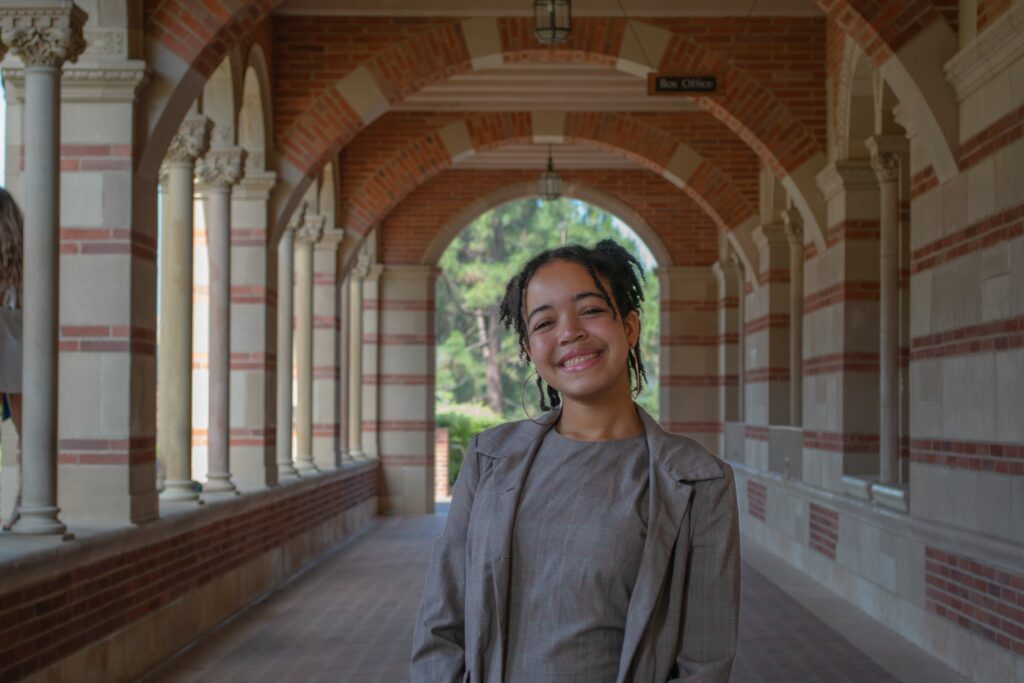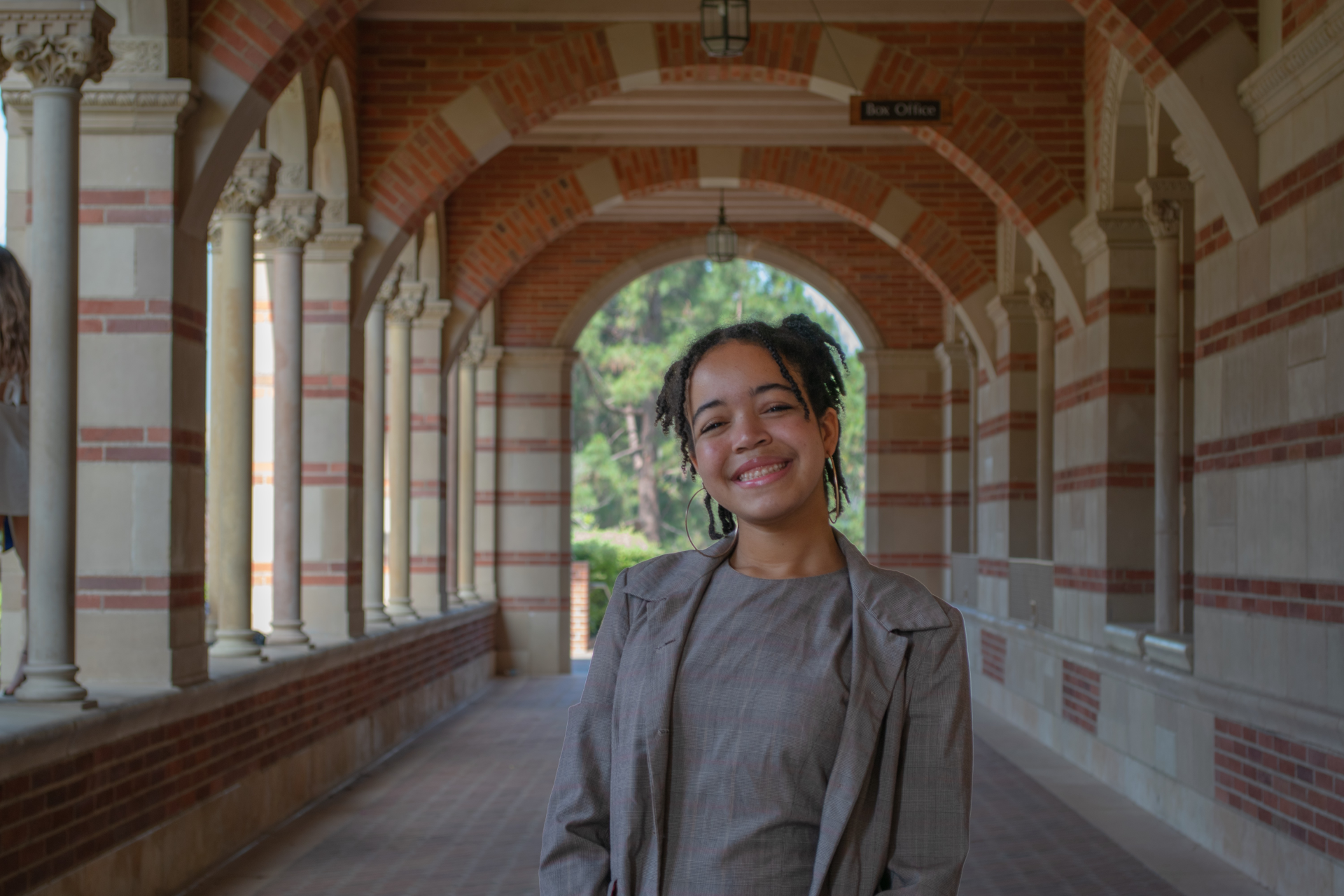Through the John Lewis Young Leaders (JLYL) program she hopes to offer theater-based civic engagement classes for youth

Citlalli Chávez-Nava
Chania Rene-Corail, a second-year political science and international development studies major, was named a 2025-26 fellow for Robert F. Kennedy Human Rights’ John Lewis Young Leaders program (JLYL), a year-long undergraduate fellowship that prepares college students for a future in community organizing and civic engagement.
Selected among a highly competitive pool of over 550 applicants, Rene-Corail will join 15 other students from public and private universities across the country in this year’s cohort. During the program, fellows engage their campus and local communities in human rights work through a capstone project. They also gain access to comprehensive grassroots organizing workshops, 1:1 mentorship from RFK Human Rights staff, financial support and access to an extensive network of human rights professionals, peers and program alumni.
“This year’s cohort is an extraordinary group of young people, and I’m inspired by their courage, kindness and commitment to making our country a more just and equitable place,” said Kerry Kennedy, president of RFK Human Rights. “I’m filled with hope as we welcome this next generation of leaders into the fold.”
Civic engagement through theater
A believer in the power of using art for political expression, Rene-Corail plans to partner with a local organization to offer theater-based civic engagement workshops for youth for her JLYL capstone project. She hopes to bring the program to youth that have traditionally lacked access to theater and other arts education resources to develop productions that reflect their own lived experiences.
“I want to highlight the issues that are important to the youth — issues that they may have a personal connection with,” she said. “We might even start having discussions about issues that I might not have thought were initially relevant, so this will be an interesting learning experience not only for participants but also for me.”
She hopes participants walk away with both the confidence to use the arts for social action and to also develop practical skills such as scriptwriting, public speaking, set design and other production skills that they can apply to other civic engagement and professional settings in the future.
“My ultimate goal with this project is to create a new generation of creative changemakers, uniting communities and encouraging students to be the best version of themselves, whether that be through improved social emotional learning, heightened educational achievement or unlocking their passion for social engagement,” she added.
A lifelong connection to theater

The daughter of French-Caribbean parents, Rene-Corail grew up near Paris and was introduced to theater when her mother enrolled her in classes at age 2. Although she holds only vague memories of her first performances as a child, the large stage and the size of the audience left an impression on her. Since then, theater has been a recurring part of her life, with Rene-Corail returning to acting and production whenever the opportunity has arisen.
At age 12, Rene-Corail moved to the U.S. when a new job opportunity brought her father to California. The move and the onset of the COVID-19 pandemic soon after introduced new challenges and opportunities to her life.
Initially, she doubted her language skills and her ability to perform a full play in English, so she stepped away from theater for a while. But by high school, she picked it up again and began exploring new aspects of theater such as writing and directing.
Now, she’s involved in UCLA’s student-run HOOLIGAN Theater Company, which is focused on revitalizing, educating and enriching the theater community at UCLA and beyond. Last year, she served as assistant director to “Curtains” and the “SpongeBob Musical” as well as dancing in the spring showcase.
Finding her academic home at UCLA
UCLA hadn’t been on top of Rene-Corail’s list when considering her university studies. But after receiving an invitation to attend a Black excellence event for prospective high school seniors, she enjoyed her visit and grew fond of the campus. Soon after, she discovered that she could pursue her academic interests through a double major in political science and international development studies.
“It was exactly what I wanted to study,” said Rene-Corail. “And it was an opportunity to get an amazing education.”
In the political science department, Rene-Corail is taking courses within the race and ethnicity studies concentration. In her classes, she feels inspired by peers who, like her, are looking for careers that advance the broader public good rather than personal success.
Race and Indigeneity Learning Cluster Teaching Fellow, Antwann Michael Simpkins, has been Rene-Corail’s instructor in a number of seminars. He thinks she is a thoughtful, engaged student with vast leadership abilities. In his recent 10-week seminar Rene-Corail led a group project and a related classroom presentation and throughout she was generous with her time, sharing resources and providing guidance to peers who needed additional support.
“Chania is among the top students I have the pleasure of teaching in my many years in education,” said Michael Simpkins. “She is unquestionably a rising scholar who will undoubtedly make meaningful contributions not only to her most immediate context but also the world more broadly.”
As Rene-Corail begins her JLYL fellowship this fall, she hopes her theater-based project will bring the same inspiration she has found at UCLA to empower youth participants to commit to a cause larger than themselves.
“Oftentimes, young people are being told: ‘You’re the future of our society. We’re counting on you to make our world a better place,’ but at the same time, we’re not providing them with the tools to do so. So, my project aims to change that.”

